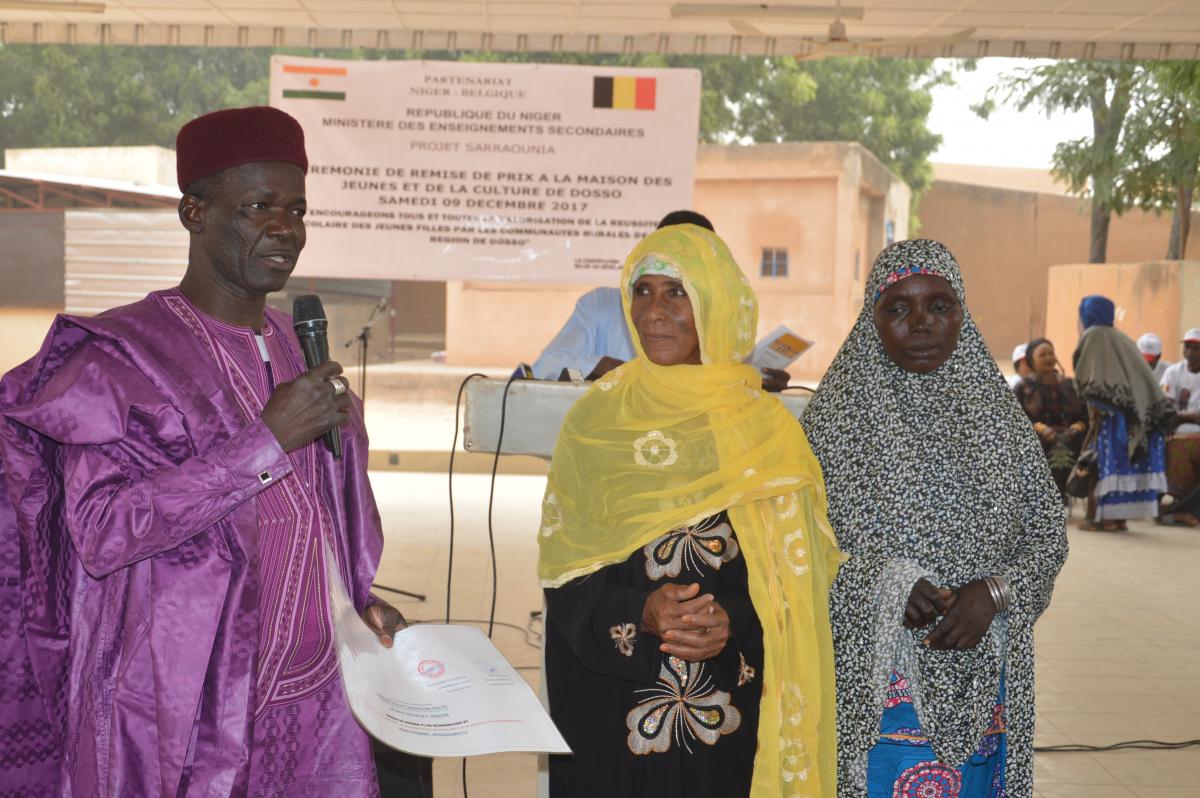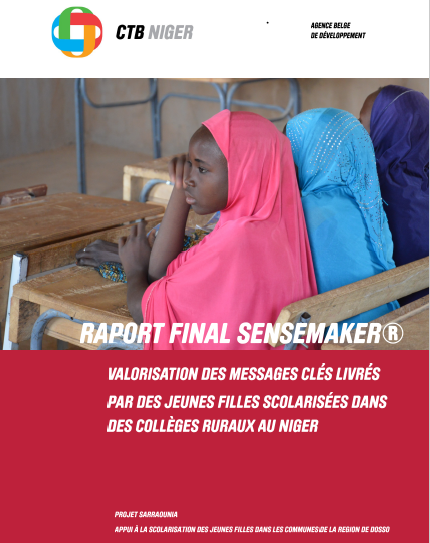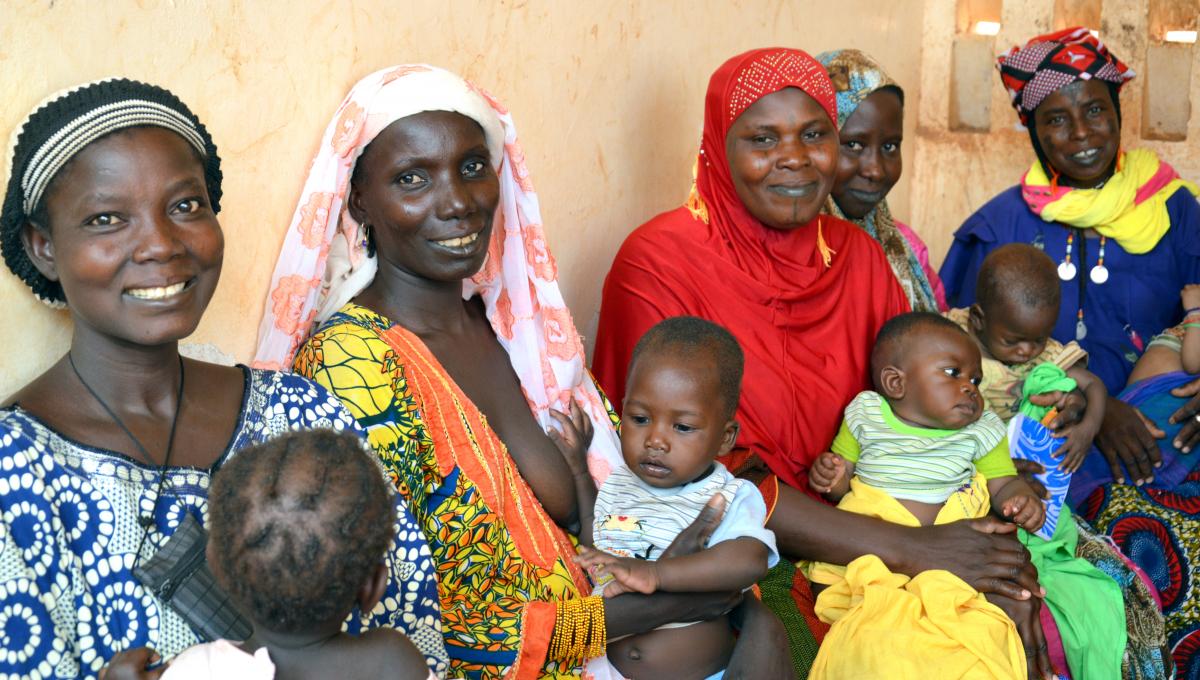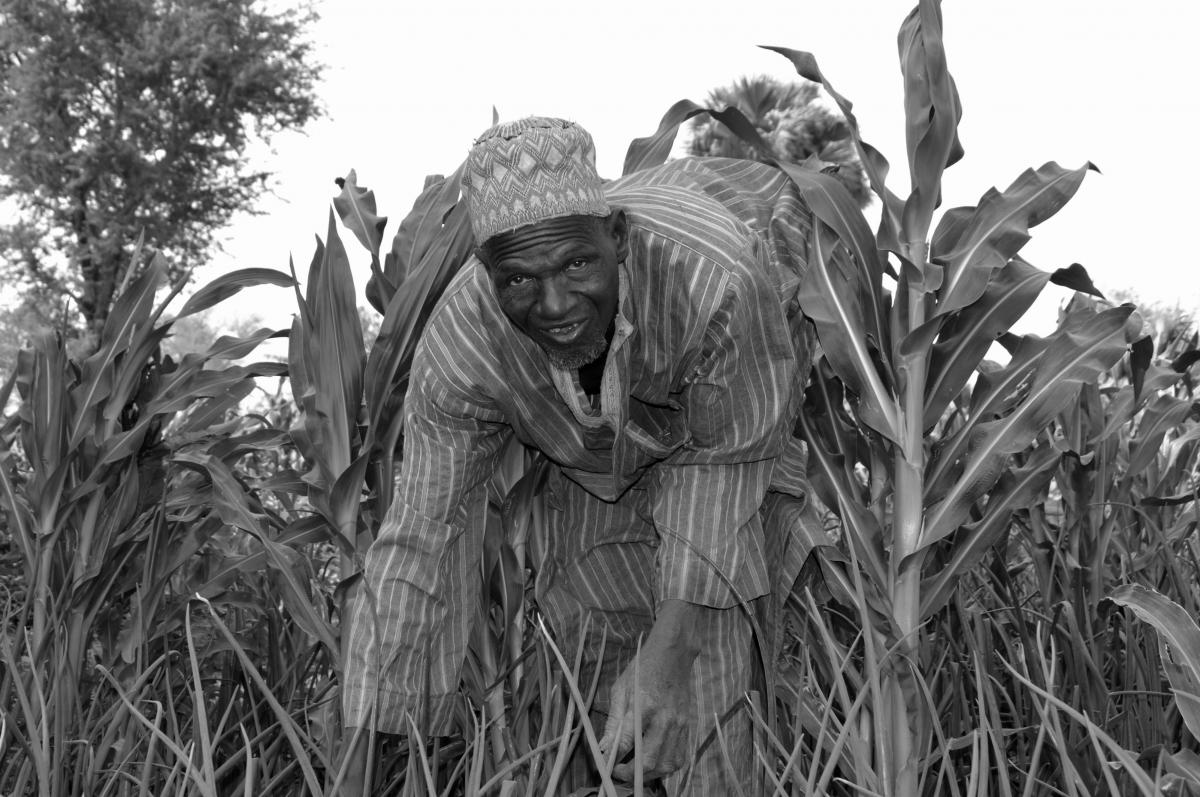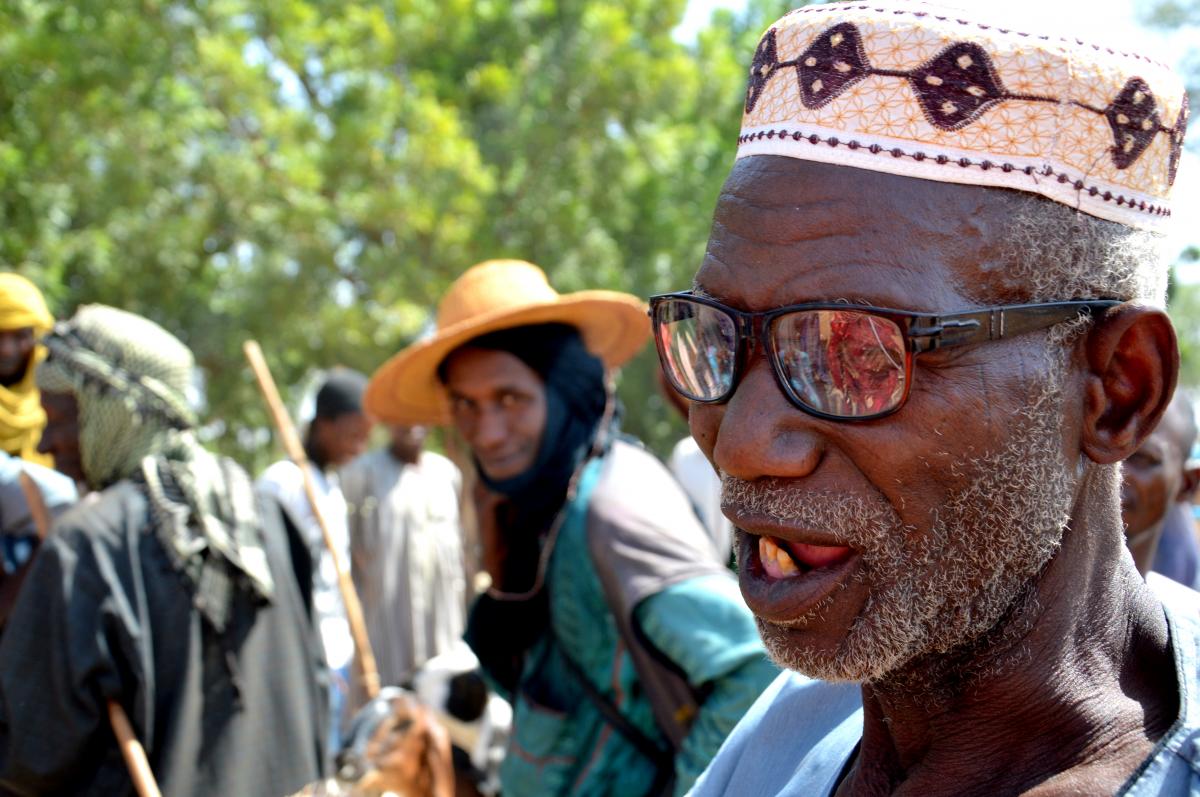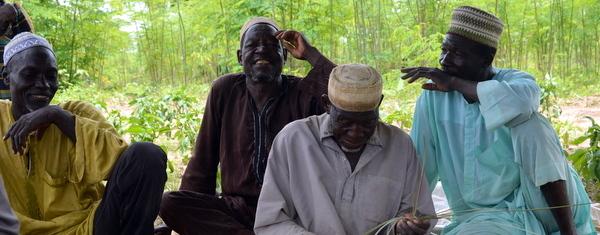Rechercher
Affichage de 75 à 90 sur 102 actualités
-
Compétition Sarraounia : la valorisation sociale de modèles locaux engagés
Céline MEWISSEN | 28/05/2018
Dans le cadre du projet Sarraounia, la première édition de la Compétition Sarraounia a été organisée afin de récompenser les meilleur(e)s élèves de l’année, mais pas seulement. En effet, l’originalité de cette compétition réside dans son caractère inclusif : plusieurs catégories de prix ont été décernées afin de récompenser l'engagement individuel et communautaire des acteurs locaux en faveur de la scolarisation de la jeune fille. En premier lieu, c’est l'engagement de la jeune fille et la promotion du modèle de la jeune fille qui réussit ses études qui ont été mis en avant. En récompensant des modèles de jeunes filles qui réussissent leurs études, le projet vise à emmener progressivement la majorité des individus dans les communautés rurales cibles à percevoir la réussite scolaire comme une meilleure opportunité pour la jeune fille scolarisée que le mariage précoce. Ensuite, l'engagement des structures scolaires et des leaders locaux a été mis à l’honneur à travers l’attribution de prix aux acteurs locaux les plus engagés. Ont notamment été ciblés : les Comités de Gestion des Etablissements Scolaires les plus dynamiques et un leader religieux particulièrement engagé. Enfin, l'engagement des parents d'élèves et la promotion du modèle de parents d'élèves qui encouragent la réussite scolaire de la jeune fille individuellement au niveau des familles a été récompensé. En récompensant individuellement les parents d'élèves qui encouragent le plus leurs filles scolarisées jusqu'à l'obtention de leur BEPC, Sarraounia a adopté une approche innovante.
-

L'élevage au Niger: un secteur d'avenir
Guido COUCK | 19/01/2018
Au Niger, l’élevage est un secteur fondamental, tout particulièrement dans la région de Tahoua où presque 90% de la population pratique cette activité à titre principal ou accessoire.Les éleveurs font face à de nombreux défis, tels que la baisse des ressources naturelles, les changements climatiques ou encore la récurrence des problèmes sanitaires.C’est dans ce contexte que le projet PAPAT a été mis en œuvre avec pour objectif de contribuer à l’augmentation de la sécurité alimentaire et des revenus tirés des activités pastorales. Réalisation et réhabilitation d’infrastructures d’hydraulique pastorale, sécurisation et valorisation des espaces pastoraux, appui aux communes, équipement du laboratoire central de l’élevage de Tahoua, formation de techniciens ou encore appui aux programmes nationaux de vaccination, telles sont les activités qui ont été réalisées depuis 2014 afin d’améliorer le quotidien de la population.Découvrez l’impact du projet dans la région à travers les témoignages de partenaires et de bénéficiaires.
-
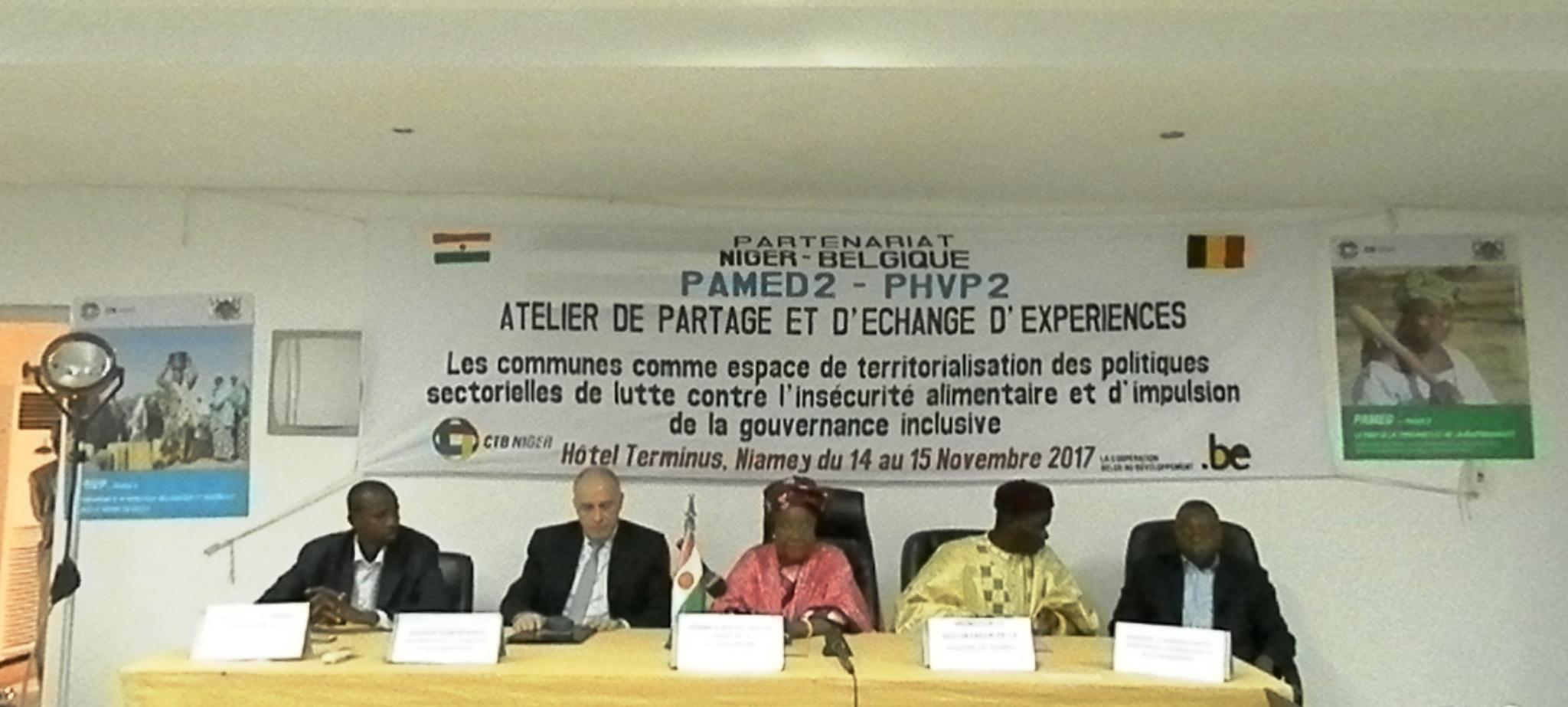
Les communes comme espace de territorialisation des politiques sectorielles de lutte contre l’insécurité alimentaire et d’impulsion de la gouvernance
Céline MEWISSEN | 11/12/2017
L’Atelier sous régional d’échanges et de partage d’expériences du Programme d’Appui à la mise en place des entités décentralisées dans la région de Dosso phase 2 (PAMED2) et du Programme Hydraulique Villageoise et Pastorale 2 (PHVP2) s’est tenu du 14 au 15 novembre 2017 dans la salle de réunion de l’Hôtel Terminus de Niamey sous le haut patronage de Madame HAPSATOU MAIZOUMBOU Ministre Déléguée en charge de la Décentralisation : « Je me réjouis, très sincèrement, des résultats positifs auxquels le Projet est parvenu. C’est le lieu pour moi de réitérer ici, au nom du Gouvernement du Niger et en mon nom propre mes remerciements et ma reconnaissance au Royaume de Belgique qui a permis le financement de cet important projet qui a toujours fait notre fierté tant par sa contribution à l’amélioration de la sécurité alimentaire que par son caractère innovant en matière de mise en œuvre de la décentralisation et de la gouvernance locale ». Centré sur le thème « Les communes comme espace de territorialisation des politiques sectorielles de lutte contre l’insécurité alimentaire et d’impulsion de la gouvernance inclusive », il a réuni des acteurs venus de plusieurs régions du pays, du niveau central, des partenaires techniques et financiers ainsi que des participants venus de pays limitrophes : le Bénin, le Burkina Faso et le Mali. Plusieurs thématiques ont été débattues dont entre autres: la maîtrise d’ouvrage communale, la gestion durable des investissements publics communaux, le suivi du développement communal, la mesure de la performance en gouvernance communale, l’accès des femmes au foncier, le financement du développement local, etc. Les présentations, les débats et les témoignages des acteurs ont mis en exergue un niveau de satisfaction élevé des acteurs par rapport aux résultats atteints par les deux programmes. Ainsi, il ressort que l’amélioration nette de la gouvernance communale a contribué à faire des communes des entités viables capables de conduire un processus de localisation de la politique nationale de sécurité alimentaire qui a permis de porter le taux de couverture alimentaire de 11% à 13% et de réduire le taux de ménages vulnérables de 30% à 13% entre 2012 et 2017 dans les 12 communes d’intervention du PAMED2. Des modèles intéressants de financement du développement d’autres pays ont été présentés par la Commission Nationale des Finances Locales du Bénin et la CTB Mali ainsi que de LuxDev et de UNCDF et ont suscité de riches débats entre les participants. Des travaux de groupes ont également été organisés autour de thématiques de l’approche pôle de développement et la valorisation des filières porteuses, ainsi que le rôle des collectivités dans la promotion de l’emploi et de l’initiative privée des jeunes. Les participants ont insisté sur la nécessité de veiller à une meilleure implication des bénéficiaires dans la conception des microprojets pour assurer une appropriation optimale et leur durabilité. Les communes ont également été interpellées pour plus d’implication et de responsabilité dans la gestion durable des investissements communaux de sécurité alimentaire. Dans le souci d’un développement équilibré, les participants ont recommandé à l’Etat de prendre les mesures appropriées pour une mise à l’échelle de certains outils/approches du PAMED2 afin d’éviter une communalisation à double vitesse dans laquelle certaines communes performent tandis que d’autres trainent le pas. Enfin, une motion spéciale a été adressée au Royaume de Belgique et à la Coopération Technique Belge (CTB) pour tous les appuis apportés dans l’amélioration des conditions de vie des populations de la Région de Dosso. Ils ont saisi l’occasion pour demander le renouvellement des programmes PAMED et PHVP.
-
Raport Final Sensemaker: Valorisation des messages clés livrés par des jeunes filles scolarisées dans des collèges ruraux au Niger
Eva VAN STEIJVOORT | 31/10/2017
Pour mieux comprendre les facteurs de résilience des jeunes filles scolarisées dans six collèges ruraux pilotes, le projet Sarraounia a jugé nécessaire d’expérimenter une méthodologie innovante de suivi-évaluation : le Sensemaker®. L’application de cette méthodologie participative donne l’opportunité unique aux jeunes filles de témoigner en toute confiance sur leur quotidien. C’est d’autant plus pertinent pour le projet, que cela permet de mettre en exergue la voix des jeunes filles scolarisées des six collèges ciblées. Les histoires racontées par ces jeunes filles nous livrent des témoignages sincères sur les réalités d’une jeune fille scolarisée dans un collège rural au Niger.Les résultats significatifs issus de l’analyse de ces histoires de vie sont présentés dans ce rapport de synthèse. En aidant à mieux comprendre, ce qui motive réellement ces jeunes filles à persévérer dans leurs études malgré tous les obstacles qu’elles rencontrent, nous pourrons faire des recommandations pertinentes aux différentes parties prenantes impliquées dans la mise en oeuvre de ce projet, afin de mieux réorienter les activités de sensibilisation en cours sur le terrain.https://www.btcctb.org/fr/publication/valorisation-des-messages-cles-livres-par-des-jeunes-filles-scolarisees-dans-six
-

Chaque voix est unique!
Stephanie EECKMAN | 24/08/2017
Les vacances n'empêchent pas notre projet Sarraounia de continuer son travail d’amélioration de la rétention des filles dans l’enseignement secondaire. La preuve avec un théâtre participatif dans les collèges de Birni N’Falla, Tombo Kasso, Malam Koara, Kossèye, Yéni et le complexe d’enseignement secondaire de Kiota! Découvrez comment le théâtre participatif implique chaque membre de la communauté pour améliorer l'environnement scolaire.
-

-
Réduire les inégalités en matière de santé
Stephanie EECKMAN | 23/08/2017
Il est 9 heures du matin et le soleil est déjà haut dans le ciel de Boulkagou, un village à environ 120 kilomètres de Niamey. Dans le Centre de Santé Intégré, un groupe de femmes attend avec beaucoup d'impatience l’arrivée de la sage-femme. Il est vrai que les choses ont bien changé à Boulkagou. Avant l’intervention de la CTB, ces femmes devaient se rendre à Gothèye pour se faire soigner, faire appel à des agents de santé mobiles circulant à moto dans cette région désertique ou acheter des médicaments vendus dans les rues. L'ouverture du Centre de Santé Intégré, en mauvais état depuis des années, leur permet enfin d'avoir accès à des soins de santé de qualité. Les locaux ont été entièrement réfectionnés et les conditions de travail se sont nettement améliorées. Mieux encore, la case de santé de ce village a, en plus des travaux de réhabilitation, été équipé en matériel et a bénéficié d'une moto. « Avant, nous n'avions ni table de consultation, ni lit d'accouchement, ni matériel de consultation prénatale et nourrisson. Et voilà que maintenant, la CTB vient de mettre à notre disposition tout ce matériel », témoigne Issaka Tahirou, infirmier de Centre de Santé Intégré. En plus du matériel, la petite pharmacie du centre de santé a été garnie en produits pharmaceutiques essentiels. Avec ces nouvelles conditions de travail, la fréquentation de la case de santé a augmenté. « Ce dernier trimestre, nous avons enregistré pas moins de 4.004 consultations», affirme Issaka. « des chiffres pareils témoignent de la pertinence d’une telle initiative ». En effet, des centres de santé équipés dans une zone comme celle de Boulkagou, c'est plus qu'une nécessité. Dans l'organisation pyramidale du système de santé au Niger, les Centres de Santé Intégrés constituent la structure de base offerte aux communautés villageoises pour leur procurer les premiers soins médicaux. Ils jouent le rôle de dispensaire et assure, avec un équipement minimum, les soins de santé primaires: consultation curative, vaccination et le planning familial, la consultation prénatale et l’accouchement. Les 15 structures réhabilitées, soutenues et approvisionnées par la CTB à travers le Projet d’Appui au Renforcement du Système de Santé du Niger (PARSS) améliorent donc considérablement l’accès à des soins de qualité pour plus de 90.000 habitants des régions de Maradi, Zinder et Tillabéri, en particulier en termes de protection maternelle et infantile. Contribuer à réduire la mortalité maternelle et néonatale « Accoucher au Niger apporte souvent une grande souffrance. J'ai rencontré d'énormes difficultés par le passé et j’ai déjà perdu 8 enfants. Lorsque j’ai accouché de mes derniers jumeaux, je me suis rendu ici et sans l’intervention du docteur je n’aurais peut-être pas survécu. Sans ce centre de santé, j'aurais dû me rendre à 45km d’ici pour recevoir les soins dont j’avais besoin. Même en louant la charrette de mon voisin, un tel voyage serait très difficile. Au moins maintenant, nous avons tout sur place et les soins sont de bonne qualité. » (Mariama, 35) « La région est classée comme une région pauvre », explique Issaka « Et la pauvreté est très associée à la santé maternelle. Beaucoup de mères ont des problèmes de reproduction. Nous voyons de nombreuses urgences obstétricales parce que les femmes vivent si loin, et, en cas d'urgence, les entraîner ici devient un défi » . « Au Niger, comme beaucoup de pays africains, la femme est responsable de sa famille. C'est elle qui s'occupe des enfants, nourrit la famille et veille à ce que la famille soit saine », nous confirme Dr Soumana Adamou Hamma, responsable national du projet PARSS. « La plupart de nigériens vivent dans des zones rurales et là, nous ne disposons pas d'installations de santé adéquates, de sorte que les femmes doivent parcourir de très longues distances pour rechercher des services de santé. Et c'est encore pire quand elles sont enceintes. Trop souvent, elles accouchent à la maison, peut-être avec une sage-femme traditionnelle, peut-être avec une belle-mère ou avec une voisine. Donc, quand il y a des complications, elles ne savent pas quoi faire et la femme est en risque de mourir », explique-t-il. «Nous mettons l'accent sur la fréquentation et surtout les soins aux femmes enceintes et aux enfants de moins de cinq ans ». À l'heure actuelle, la principale cause de mortalité maternelle au Niger est l'hémorragie. «Nous détenons le taux de fécondité le plus élevé au monde avec 7 enfants en moyenne par femme. Il est clair que cela entraine souvent des complications à l'accouchement. Les femmes saignent à mort pendant ou après l'accouchement parce qu'elles ne peuvent pas atteindre les établissements de santé. Pourtant, accoucher dans un centre médical est fondamental pour la santé de la mère et du nouveau-né. », nous dit Dr Hama, « C’est bien pour cela que nous sommes en partenariat avec le gouvernement nigérien, pour nous assurer que les services peuvent atteindre les mères et les enfants là où ils se trouvent ». Chiffres clés : - Le taux de mortalité maternelle au Niger se situe quant à lui à 553 décès pour 100.000 naissances vivantes , tandis que le taux de mortalité infanto-juvénile s'élève aujourd’hui à 26.8 pour 1.000 naissances vivantes. - Seulement 39.7% des accouchements sont assistés par du personnel formé. Le Projet d'Appui au Renforcement du Système de Santé (PARSS) appuie les système de santé nigérien à travers des investissements en infrastructures et équipements. Il s’agit notamment de la construction de 4 hôpitaux de district, la transformation de 15 cases de santé en centres de santé intégrés et un appui à l’organisation des consultations foraines et mobiles pour atteindre les populations résident dans des zones reculées .
-

Un nouveau destin à travers la vannerie
Stephanie EECKMAN | 23/08/2017
La force et la résilience des femmes nigériennes est sans limite. A l’aube de la journée de la femme nigérienne, nous sommes fières de vous présenter Sahia, entrepreneuse, elle démontre son courage au quotidien. Ensemble, poursuivons notre combat pour garantir aux femmes la place qu’elles méritent dans notre société.
-

La terre aux femmes qui la travaillent
Stephanie EECKMAN | 23/08/2017
Les femmes des villages reculés sont très rarement sous les feux des projecteurs, mais aujourd’hui, ce sont elles qui sont à l’honneur. Nous avons profité du 8 mars pour mettre en lumière une lutte importante qui reste à mener. Laquelle? Découvrez la réponse dans notre vidéo!
-

La restitution publique, une confiance partagée
Stephanie EECKMAN | 23/08/2017
« Les séances de restitution publique nous permet de comprendre dans quels domaines, la commune a investi l’argent de nos impôts. Ce sont ce genre d’initiatives qui permettent de créer un climat de confiance entre la mairie et les administrés. » témoigne Abdoul Salam Garba, chef de village de Tounga Chao, un village au sud-est du Niger. Le Programme d’Appui à la Mise en place des Entités Décentralisées dans la région de Dosso, phase 2 (PAMEDII) accompagne 12 communes dans la région de Dosso dans l’amélioration de la gouvernance communale, notamment en matière de planification et de suivi du développement communal, de mobilisation et de gestion transparente des ressources locales et de promotion d’un dialogue et d’une concertation entre les acteurs communaux afin d’être véritablement au service de la population, améliorant les vies des plus pauvres et des plus vulnérables.
-
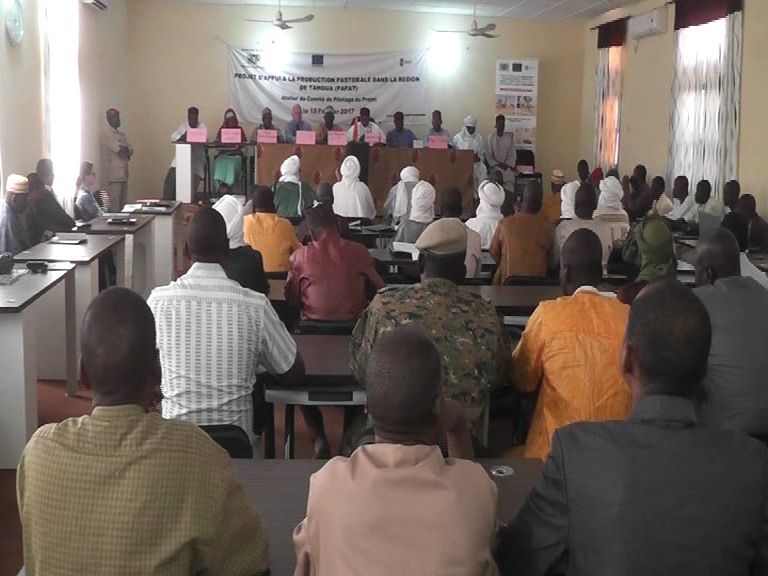
Troisième atelier du Comité de Concertation et de Suivi du Projet PAPAT
Stephanie EECKMAN | 07/03/2017
Le troisième atelier du comité de pilotage du Projet d’Appui à la Production Pastorale dans la Légion de Tahoua (PAPAT) s’est déroulé le 15 février 2017, dans la salle de la Mutuelle d’Epargne et de Crédit Daouré de Tahoua. Cet atelier a enregistré en plus des membres du Comité de Concertation et de Suivi du Projet, la présence du Gouverneur de la région, les représentants de la SDS Sahel-Niger, du ministère de l’Agriculture et de l’Elevage, de la Délégation de l’UE, de la Cellule de l’UE et des Représentants-Résidents de la CTB. L’objectif de cet atelier était de permettre au comité de pilotage d’apprécier l’état des activités réalisées en 2016. Dans sa présentation, le chef de projet a exposé l’état d’avancement des activités des différents volets du projet (Ouvrages hydrauliques, aménagements pastoraux et santé animale). C’est ainsi qu’en fin décembre 2016 14 forages ; 1 puits et 10 cases de santé vétérinaires ont été réalisés ou réhabilités. De plus, 13 Associations des Usagers du Service Publique de l’Eau ; 23 Comités de Gestion des Points d’Eau et 23 Comités de gestion des sites Restaurés / Conservation des Eaux du Sol et Défense et Restauration des Sols ont été mis en place. En termes difficultés, le projet a été confronté au non-respect des engagements pris par les acteurs locaux pour la mise en défens des sites restaurés, un retard accusé dans l’exécution de certains puits pastoraux et la réticence de certaines communautés à se conformer à la loi relative à la mise en gestion déléguée des stations de pompage pastorales. Pour lever tout goulot d’étranglement, des recommandations ont été formulé.
-
La période de soudure fait place à une récolte d'abondance
Stephanie EECKMAN | 10/02/2017
Grâce à l'amélioration de l'irrigation sur son terrain grâce au programme PAMEDII de CTB Niger, Mahaman Bachar produit plus et fournit la sécurité alimentaire pour sa famille. Mahaman travaille sur ses terres dans la commune de Dosso depuis plus de trois décennies. Année après année, sa famille menait une vie difficile: ils cultivaient du mil, et les pluies - avec un peu de bonne chance - déterminaient combien de nourriture ils pouvaient manger chaque année.Il y a trois ans, grâce à la CTB Niger, un périmètre maraîcher irrigué a été mis en place sur ses terres. Ce périmètre est avant tout communautaire. Tout le monde s’affaire pour que le projet soit un succès. L’intérêt pour la communauté est manifeste : « le maraîchage nous apporte des revenus supplémentaires, de quoi augmenter et diversifier notre nourriture, et crée une dynamique positive dans le village qui donne envie d’entreprendre de nouvelles choses. » « Dans ma parcelle, j’ai commencé à planter du maïs, des oignons et des tomates. Une partie de ma récolte est destinée à la vente, une autre à la cuisine quotidienne pour ma famille. » La saison de faim de sa famille a été remplacée par une récolte d'abondance. « Vous savez, il y a tout juste deux ans, je n’avais pas assez pour nourrir ma famille », déclare Mahaman, qui vit dans un complexe familial qui compte 16 enfants. « Maintenant tout le monde mange et nous pouvons vendre le supplément. » « La vie », dit-il, « est maintenant beaucoup mieux. »
-
Un impôt sur le bétail? Pas bête du tout!
Stephanie EECKMAN | 30/11/2016
Le troupeau est aux éleveurs nigériens ce qu'un compte en banque est à la plupart d'entre nous. Il faut en prendre soin. Parmi les nombreuses mesures de soutien proposées aux éleveurs du Sahel nigérien, la CTB finance des programmes de vaccination du bétail et des points de vente sous le contrôle des communes. A 150 km à l'est de la capitale Niamey, le marché de Gouala est le plus important de la commune de Kiéché. Chaque mercredi, toutes sortes de marchandises s’échangent du matin au soir dans une ambiance joyeuse et poussiéreuse. Mais tandis que les commerçants présentent leurs produits sur des étals bien alignés, le business du bétail se faisait dans une belle anarchie. Impossible d’en contrôler les échanges. Il y a deux ans, la mairie de Kiéché a donc décidé de faire le ménage dans le marché. Grâce à l’appui de la CTB, elle a réussi à construire deux marchés de bétail à Gouala. Un parc à petits ruminants – moutons et chèvres – où l’entrée est fixée à 50 FCFA par tête et à 200 FCFA par vente, et un parc à gros ruminants – bovins et camélidés – qui engrange des montants plus importants, car la valeur d’une vache est bien supérieure à celle d’une chèvre. Ces marchés ont connu un succès immédiat qui permet non seulement d’optimiser les échanges entre acheteurs et vendeurs. «On s’est levé à Kiéché, » nous confirme Boubacar China, président du comité de gestion du marché de bétail à Gouala. « C’est vrai que notre système de taxation nous permet d’investir davantage dans le développement de notre commune, mais il ne faut pas oublier que nous avons surtout institué ce marché pour éviter les plaintes entre les populations, » explique-t-il. Il relate que pour chaque animal vendu, le comité établit un ticket de vente. Sur ce ticket, qui constitue la carte d’assurance contre les tracasseries, sont mentionnés le nom du vendeur, les caractéristiques extérieures de l’animal et toutes les indications permettant d’identifier l’animal et de disculper, le cas échéant, son propriétaire. « Et comme ça, il n’y a plus d’accusations de vol ni d’autres chamailleries, » nous dit-il. « Toutes les transactions sont désormais bien documentées. » Pas de développement durable sans coût Mais les marchés de bétail permettent bien sûr aussi d’alimenter les caisses communales. Les bénéfices ainsi engrangés permettent de financer une partie du Plan de Développement Communal dont Kiéché s’est doté. Un apport bienvenu, quand on sait que depuis la réforme gouvernementale de 2002 prônant la décentralisation, les communes du Niger doivent faire face à davantage de responsabilités. Cependant, le pouvoir central ne met guère à la disposition des communes les moyens financiers dont elles ont besoin pour mettre en œuvre cette réforme. Comme elles ne peuvent pas compter sur l’aide de l’Etat central, les communes - tout comme celle de Kiéché - font preuve d'initiatives et de créativité pour disposer des fonds nécessaires afin d'améliorer durablement le bien-être de leurs administrés. En donnant un coup de pouce simple mais concret à aux communes de la région de Dosso, la CTB initie un processus irrémédiable.
-
Un savoir-faire pour un changement de comportement
Stephanie EECKMAN | 02/09/2016
Au milieu des vastes étendues de champs de mil qui tapissent la région de Dosso, apparait un coin de verdure: le site maraicher de Tounga Hassada. En effet, la région de Dosso est aride, mais dispose d'un important potentiel d'irrigation: la nappe phréatique des vallées fossiles des dallols est peu profonde. Pourtant, plusieurs contraintes d'exploitation sont difficiles à surmonter pour les producteurs Dossolais: le captage et la distribution de l'eau dans les parcelles, le faible accès aux intrants agricoles et la maitrise partielle des techniques de production et d’irrigation. Cette précarité débouche une pauvreté généralisée et une insécurité alimentaire chronique. En effet, la proportion de personnes en insécurité alimentaire peut atteindre jusqu’à 80%. Face à cette situation, le Programme d’Appui à la Mise en Place des Entités Décentralisés dans la Région de Dosso, Phase 2 (PAMED2) s’est mobilisé et à ciblé plus de 625.136 personnes parmi les plus vulnérables. L’objectif du PAMED2 est de contribuer à la sécurité alimentaire en renforçant la gouvernance locale dans un contexte de jeune décentralisation. En effet, la mise en œuvre du programme repose sur une responsabilisation des communes dans leur rôle de coordinateur du développement local et de fournisseur de services publics de proximité. Ce sont les communes qui définissent les projets de terrain à financer, qui en assument la maîtrise d’ouvrage et qui sont chargées de leur bonne utilisation. Le cas des sites maraîchers dans la commune de Douméga illustrent que des paysans pauvres peuvent accroître leur potentiel de productivité quand de bonnes politiques et pratiques sont mises en place. En effet, le maraichage joue un rôle important sur la sécurité alimentaire et nutritionnelle de la commune depuis 2012. Avec l’appui du PAMED2, elle investit dans l’aménagement des terres agricoles au profit des couches vulnérables (puits cimentés, clôture en grillage, motopompes,…). Bien que le maraîchage n’est pas exceptionnel au Niger, le fait que les maraichers à Douméga prévoient de continuer leur activité durant la saison des pluies (juin à septembre) l’est certainement, car la majorité des producteurs nigériens abandonnent le maraichage pour se concentrer essentiellement sur la culture du mil. Cet exemple d’accès à long terme à la terre sur ces sites, marque la volonté des propriétaires fonciers et des chefs de village; soucieux du bien-être de leurs communautés. « Ici, on a montré aux propriétaires des terres qu’en pratiquant les cultures de contre-saison durant la campagne pluvieuse, ils pouvaient augmenter considérablement leurs propres revenus agricoles. Cette pratique a permis de convaincre certains propriétaires fonciers d’accepter à faire une donation de terres destinées à l’aménagement au profit des vulnérables. Ces propriétaires fonciers terriens volontaires ont bénéficié d’appuis en intrants et en petits matériels agricoles afin d’essayer de pratiquer les cultures maraîchères en saison des pluies. Dans ce cas, les propriétaires restent eux-mêmes installés sur une partie du site aménagé et bénéficient donc du même encadrement fourni aux maraîchers par le PAMED2. », nous explique Oumarou Chérif, maire de Douméga. « Changer soi-même peut être difficile, mais inculquer le changement aux autres est un véritable défi. Le savoir seul ne suffit pas : la formation, les bonnes pratiques doivent être adoptées localement et démontrer leurs avantages tangibles. Le savoir convaincu par l’exemple sont les meilleurs arguments pour que les paysans transforment le savoir en initiatives concrètes». Pour Oumarou Emana, secrétaire général du site de Tounga Hassada, la pratique de culture de contre saison est une activité génératrice de revenus. « Je fais le maraîchage depuis l’installation de ce site. Je cultive de la salade, des tomates, des poivrons, des oignions et des pastèques. Mais c’est surtout la pastèque qui rapporte l’essentiel de nos revenus. Par récolte, cela peut nous rapporter 60.000 à 100.000FCFA par personne. Les ressources tirées de cette activité permettent de financer les études de nos enfants; d’acheter des animaux pour faire l’embouche, de satisfaire les besoins quotidiens : de manger, de se soigner en cas de maladie et d’aider certains membres de la famille » L’assimilation du savoir se fait par l’appropriation. Savoir, c’est pouvoir. Le savoir est donc capital pour susciter le changement. Cependant, ce n’est que lorsque tous les acteurs concernés – l’exécutif communal, les agents des services techniques, les chefs coutumiers, les producteurs/productrices et les propriétaires des terres privées- deviennent acteurs du changement que ce dernier s’opère réellement. C’est pourquoi ils doivent tous s’approprier les compétences et bonnes pratiques. Avant tout, les formations et bonnes pratiques doivent répondre à de réels besoins. Les communes sont bien placées pour définir les besoins de formation et les communiquer, mais l’implication de tous les acteurs dans la dissémination est un atout pour l’appropriation mais aussi pour la diffusion à grande échelle et à bas cout. La réussite à Douméga tient à la capacité de la mairie à réunir tous les acteurs autour de décisions prises en commun, mais également à la pertinence de ses interventions et leur adoption par les propriétaires des terres et des producteurs. «L'expérience de notre commune en matière de promotion des filières agricoles sera capitalisée à travers des visites de terrain. Cela permettra de sensibiliser les autres maires pour qu'ils appuient davantage le développement agricole en faisant des investissements qui rapportent aux communes et améliorent les revenus des producteurs, et donc le développement économique et social de la commune» nous dit Oumarou Chérif, démontrant ainsi sa volonté de soutenir ce changement auprès des autres communes dans la région. En comprenant les besoins partages par une grande partie de la population, il est possible de proposer des actions qui conviennent à tous et qui peuvent être répliquées. Cela apporte des économies d’échelle, réunit une communauté d’individus partageant une expérience collective et formant une masse critique d’ambassadeurs du projet. Enfin, cette approche rend plus visibles et comparables les changements apportés à la population, ce qui soutient également la dynamique de la redevabilité de la commune face à ses investissements communaux. C’est dans cette optique que, au mois de septembre, le PAMED2 organisera, en collaboration avec la Coordination Régionale de l’Initiative 3N, la Chambre Régionale d’Agriculture et la Direction Régionale de l’Agriculture, un voyage d’étude au profit des producteurs et propriétaires terriens des sites réalisés dans le cadre du Fonds de Développement Communal.
-
Vers l’implémentation du financement basé sur les résultats : une meilleure gestion des ressources humaines en santé
Stephanie EECKMAN | 01/09/2016
Dans sa volonté d’atteindre les Objectifs de Développement Durable, le Niger s’emploie à trouver des solutions concrètes pour corriger les indicateurs peu reluisants pour le secteur de la santé. L’un des objectifs du Ministère de la Santé Publique est d’améliorer la performance du système de santé nigérien à travers le financement basé sur les résultats (FBR). Le FBR est une approche axée sur les résultats du système de santé, définis comme la quantité et la qualité des services financièrement accessibles, produits et proposés aux populations par le biais d’un contrat de performance. En effet, une approche qui marque la rupture avec le financement classique du système de santé qui consistait à fournir les inputs sans atteindre nécessairement des résultats. L’effet recherché par cette approche est de renforcer le système de santé, le suivi et l’évaluation, et la performance du système de santé par l’augmentation de l’utilisation, la quantité et la qualité des services offerts. A travers les primes à la performance du personnel de santé, le FBR compte également créer la motivation nécessaire du personnel et ainsi assurer la qualité des prestations. Non seulement, le personnel recevra une prime sur le salaire basée sur la performance individuelle et collective, mais la qualité des prestations se reflètera aussi dans le montant global qu’une formation sanitaire recevra. Le FBR peut contribuer à une amélioration de la qualité mais il y a aussi d’autres mécanismes pour assurer la qualité des soins et la performance du personnel (voir plus loin). Le FBR a été expérimenté avec succès dans les pays à bas revenus comme le Cambodge en Asie dans les années 1990 et à partir des années 2000 dans les pays africains comme le Rwanda, la RDC, le Burundi, la RCA, le Bénin et le Cameroun. Le Ministère de la Santé du Niger quand à lui, a aussi entamé un projet pilote du FBR à Boboye (Dosso). « l’homme qu’il faut à la place qu’il faut » Les défis de l’implémentation du FBR au Niger se situent à différents niveaux, mais un des facteurs les plus importants concernent les ressources humaines. En effet, les ressources humaines en santé devront avoir une place de choix pour accompagner les réformes amorcées. L’audit organisationnel et fonctionnel du Ministère de la Santé Publique, réalisé en juin 2015, a fait ressortir la nécessité de généraliser l’outil des fiches d’emploi pour l’ensemble des agents du système. Il est alors évident que le pilotage du FBR implique des processus et outils de management et de développement des ressources humaines. En collaboration avec le Projet Appui Institutionnel (PAI-MSP), le Ministère a engagé depuis mai 2014, un processus d’élaboration des fiches de postes du personnel des différents niveaux de la pyramide sanitaire. Ces fiches de postes avec la description des activités et tâches individuelles permettront de responsabiliser les agents du niveau opérationnel à travers des objectifs clairs, base pour toute évaluation individuelle. En outre, ces fiches permettront aux décideurs de procéder à des affectations et à des nominations des agents en tenant compte de l’adéquation profil-poste, chose indispensable à une meilleure gestion du personnel de la santé en vue de garantir le bien-être des populations. De fait, avec l’appui du PAI-MSP, la Direction des Ressources Humaines a élaboré 136 fiches de postes validés pour les différents niveaux de la hiérarchie sanitaire. C’est-à-dire : 45 catégories de postes pour le personnel de l’Hôpital National, 21 catégories pour la Direction Régionale de la Santé Publique, 19 catégories pour le Centre de Santé de la Mère et de l’Enfant, 31 catégories pour le Centre Hospitalier Régional, 4 catégories pour les Districts Sanitaire, 14 catégories pour les Hôpitaux de District et 2 catégories pour les Centres de Santé Intégrés. Visant à rendre disponible un personnel compétent, motivé et suffisamment responsable dans tous les structures du pays, ces fiches feront l’objet de test dans la Région de Maradi et seront mis en application au sein des Hôpitaux de District de Gothèye, Gaya et Damagaram Takaya actuellement en construction à travers le Projet d’Appui au Renforcement du Système de Santé (PARSS).
